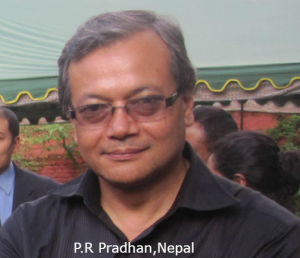“Our foreign policy experts say that Nepal has no option except from maintaining balanced relations with the two giant neighbours and other countries as well. A small mistake in maintaining foreign policy could be very costly for Nepal, they believe”.
-Excerpt from the article.
##################################################
-Pushpa Raj Pradhan
Chief Editor
The People’s Review Weekly, Nepal

Begin text:
Security and diplomacy are the two most important components of a nation. Foreign powers try to weaken these two components in the course of imposing their agendas. Attempts to drag these components into controversy are solely intended for demoralizing and weakening national strength.
Oddly, we have lawmakers who are openly campaigning for dismantling the nation’s army. Surely, those, who are voicing for downsizing the national army, are serving foreign powers’ interests who are feeding them.
In other words, they are traitors and mercenaries serving foreign powers.
Nevertheless, those people having a patriotic stance strongly condemn such elements and they have been badly exposed in the society by now.
Bamdev Gautam, a senior leader, has even said that there should be no debate on reducing the number of the national army, but the unnecessary organs such as the national assembly and provincial structures can be scrapped for reducing the government expenditure. Accordingly, RPP Nepal chair Kamal Thapa has opined that there is no question of reducing the size of the Nepal Army, moreover, he has demanded establishing an air force according to the need of the country. Accordingly, many other patriotic leaders have remarked on strengthening the Nepal Army further.
Talking about the other sensitive component, foreign policy, has also become very weak at present. Our neighboring country India, in the context of the global power shift, her present existence and strength, has not given priority to non-alignment and tilting towards the Indo-Pacific Strategy and becoming a member of the QUAD (The Quadrilateral Security Dialogue) alliance in the course of containing China.
QUAD comprises of counties like, India, the USA, Australia and Japan.

Standoff between India and China on the border dispute has compelled India for changing its alliance, in the meantime, India is unable to immediately quit its long-term partnership with Russia as presently India is solely dependent on Russian arms. Nevertheless, India may move forward gradually shifting its dependence towards the USA by forgetting its long-term partnership with Russia. We don’t know, to what extent the course of changing its partner will be beneficial for India.
We are clear that Americans look after their own business and interests than friendship.
On the other hand, China, which has emerged as a superpower, has focused on multilateralism in global leadership by replacing the present unilateral domination of the USA. In this course, the China-Russia partnership can be strengthened further in the days to come.
In this changing global power politics, Nepal has already fallen under the security trap. Ratifying the Millennium Challenge Corporation (MCC) from Parliament and writing a secret letter to the USA for joining the State Partnership Programme (SPP), both programmes under the Indo-Pacific Strategy, Nepal has already committed a serious mistake.
Abruptly, the USA which remained aloof from Nepal for decades has intensified its activities and the frequency of the visit of high-level American dignitaries has been intensified. China and India have become suspicious of such an American act.
India believes Nepal is an India-protected nation and it doesn’t like the increased presence of China and the West as well. However, patriotic Nepali citizens oppose such an Indian intention. Meanwhile, any activities in Nepal aimed at disturbing China are not acceptable to China. There is a vast difference between China of yesteryears and today. In the 80s, China was maintaining a defensive policy, whereas, China under President Xi Jinping has become offensive and stronger as well.
The situation is that India is involved in direct intervention and initiating micro-management in Nepal, whereas, America and China have intensified high-level visits to Nepal carrying their own agendas. The Americans are carrying MCC and SPP agendas, whereas, the Chinese are here with the Belt and Road Initiative (BRI) and Global Security Initiatives (GSI) , among others.
Formally, Nepal is maintaining a non-aligned foreign policy and equidistance in relations with all the countries, nevertheless, our political leaders in the government seem to be confused about maintaining the country’s foreign policy guidelines. Presently, the coalition government seems excessively tilted towards the South and the West, which could be harmful to Nepal-like countries.
Our foreign policy experts say that Nepal has no option except from maintaining balanced relations with the two giant neighbours and other countries as well. A small mistake in maintaining foreign policy could be very costly for Nepal, they believe.
End text.
# Text courtesy: The People’s Review weekly dated July 26, 2023: Ed. Upadhyaya N. P.
